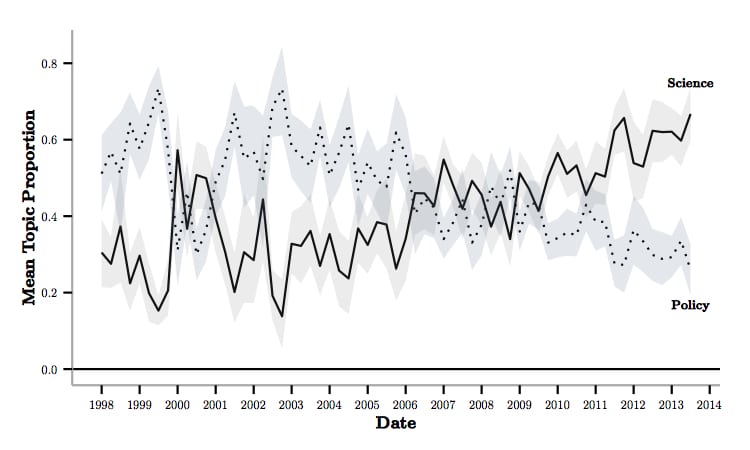Conservative think tanks in the United States are a sort of “ground zero” for the production of doubt about the links between fossil fuel burning and dangerous climate change.
These think tanks produce reports, hold conferences, write books, go on television, produce columns and blogs and generally and liberally splatter the public discourse with talking points.
You’ll have heard their manufactured doubt everywhere. “CO2 is great for the planet… fossil fuels are good… climate scientists are wrong… the world has been hotter in the past… cutting emissions will kill the economy.” That sort of thing.
But there has been speculation that as the world continues to break heat records, and as oceans rise and the science sends ever more clear and urgent signals, that the focus of these think tanks will shift away from attacking the science to discussing policy.
Now a new study published in the journal Global Environmental Change has declared unambiguously “the era of climate science denial is not over”.
Dr Travis Coan, of the University of Exeter, and Dr Constantine Boussalis, of Trinity College Dublin, analysed 16,000 articles, reports, transcripts, letters, reviews and press releases from the websites of 19 conservative think tanks, mainly based in the U.S, who work on climate change.
In the study, Boussalis and Coan discuss how commentators had been speculating about an end of climate science denial for more than a decade.
Analysing documents from 1998 until mid-2013, Boussalis and Coan found that think tanks had in recent years been focusing less on policy and more on attacking the science.
In a blog post for The Guardian, Coan told me:
In our view, meeting the challenges posed by organized climate skepticism requires accurate and systematic information on what these organizations are saying. Regarding the particular case of science vs. policy, our worry was that if enough people believed that the “era of science denial is over,” then they would – incorrectly – believe we are one step closer to achieving comprehensive climate policy.
Thinks tanks including the American Enterprise Institute, Committee for a Constructive Tomorrow, the Cato Institute, Heritage Foundation, Heartland Institute and Competitive Enterprise Institute were among those analysed.
Some of the more popular science issues attacked by the think tanks included underplaying the climate’s sensitivity to carbon dioxide, claiming that concern over emissions was just ‘alarmism’ and claiming there was no consensus among scientists that humans were causing global warming.
The new study comes after research published in late 2015 found that those think tanks who had received funding from fossil fuel interests, including oil giant Exxon and groups linked to the Koch brothers, were more likely to produce material designed to polarize the climate change issue.
Coan said it was “possible” that attacks on the science had dropped away since the period where the study ended.
But he added they were in the early stages of a follow-up study which would include analyses of climate denialist blogs, which he said tended to mirror the output from think tanks. Preliminary findings suggested that the rise in climate science denial continued through 2015. Coan said:
Again these results are preliminary, but suggest that the ‘end of science denial’ – at least among these actors – might be wishful thinking.
Also commenting on the study, Dr Aaron McCright, of Michigan State University, said the “denial machine” had been expanding beyond the think tanks to include bloggers and “astroturf” groups.
He said when it came to tackling the misinformation from the groups, it was important to “drag them from the shadows and into the bright light of day, vigilantly document their activities, and regularly call them out over what they are doing.”
Dr Riley Dunlap, of Oklahoma State University, who together with McCright has published several influential studies on the climate science denial movement, suggested the election of Barack Obama to US President in late 2008 had been an important factor in the rise of attacks on science.
Deniers were now on the outside looking in, as they could no longer count on [George W.] Bush doing nothing on climate change. So we saw denial ‘on steroids’.
Main image: Chart showing how conservative think tanks increase their attacks on science compared to policy discussions between 1998 and 2013. Image credit: Global Environmental Change.
Subscribe to our newsletter
Stay up to date with DeSmog news and alerts







